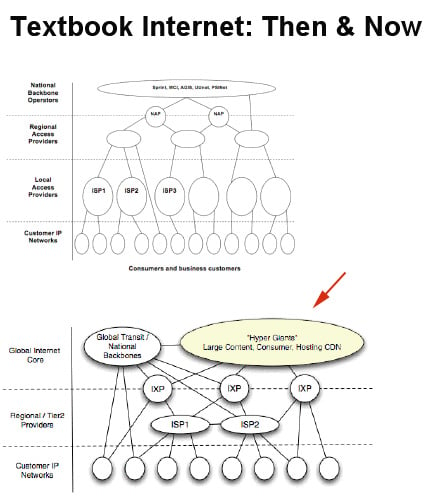General Discussion
Related: Editorials & Other Articles, Issue Forums, Alliance Forums, Region ForumsA brief reminder of the history of net neutrality as a concept
1. The term was coined in 2003 as an attempt to distinguish a desired set of goals for ISPs from the current legal status of common carrier
2. Bush's FCC chairman Michael Powell first articulated a set of net neutrality rules in 2005, which were unanimously endorsed by the commission
3. Obama's first FCC chairman, Julius Genachowski, passed a codified set of Open Internet rules in 2010. In 2011, the newly-Republican House started a bill to override those rules, and then stopped when Obama explicitly stated he would veto it.
4. In IIRC 2012, SCOTUS ruled the 2010 rules violate current law, which does not hold ISPs to be "communications providers" but rather "information providers".
5. The only other really active case on this was, odd as it sounds, completely legally unrelated because it had to do with Verizon Wireless and Google, and cell phone carriers are governed under yet a third set of rules.
6. As it legally stands now (and has forever, or at least since 2002, which for the Internet might as well be the same thing), there is nothing stopping any ISP from blocking, delaying, or otherwise filtering any traffic except for a gentlemen's agreement only to do so in obviously abusive cases (spam, viruses, etc.) This agreement, however, has been eaten into over the past couple of decades pretty regularly, with ISPs slowing down file-sharing (is this "obviously abusive"? I suppose that argument could be made) as well as VOIP (which competes with their own voice products). There have also been reports of slowing down gaming traffic -- and by many visions of net neutrality, it wouldn't matter that your neighbor's Call of Duty 4 session is keeping you from emailing your mom: first come, first served.
7. The current rules are essentially non-existent since SCOTUS struck down the 2010 rules. Wheeler is trying to get a set of rules in place rather than the vague and non-mandatory common practices that currently decide these things. This is probably a bad idea (a set of codified rules are easier to abuse than an industrial culture), but then again setting and enforcing those rules is actually his job, and the way we say we'd prefer him to go has already been struck down by the court.
8. The biggest problem here was that in 2002 the FCC said that ISPs (and I think only ones that also carry cable television) are not "communications providers". This was a stupid decision and at the root of all our problems. On the other hand, if that rule were reversed and ISPs were subject to common carrier provisions, then they would lose the tools they currently have for stopping spam, botnets, etc. (a common carrier must simply service all requests without any inspection).*
9. One idea I like that is neither NN, CC, or pay-to-play, is Wu's: ISPs can perform quality of service discrimination based on protocol, provided they do so universally and transparently. This would as I understand it fall fair of SCOTUS's complaint, keep current spam/security measures in place, and prevent a pay-to-play two-tier scenario.
10. The principle here is easy to get behind, but the actual enacted and adjudicated rule is usually something different. For that matter, from what I see from most people's sense of "net neutrality", it's several unrelated goals, some of which preclude others. Net neutrality is a slogan, not a policy, and simply pushing for it without knowing which implementation of that policy you're pushing for isn't very helpful. Given the limits in place since 2002, there's very little room for the FCC to do much of anything other than try to manage what happens next.
*11. OK, the other option is to go back to the pre-1997 days and require ISPs to wholesale bandwidth to competitors. I'm open to that idea.
steve2470
(37,457 posts)Recursion
(56,582 posts)Thanks, good article.
The topology graph is especially important:

We tend to talk about this in the language of a home Internet user (my own OP is guilty of that) but what's at stake here is what happens at the IXPs between the ISPs -- exacerbated by the fact that ISP1 may own IXP3, or be owned by the same monolith that owns it.
steve2470
(37,457 posts)He thinks net neutrality advocates are poorly informed. Is that your take ?
Recursion
(56,582 posts)Instead, video providers use - are forced to use, due to their performance requirements - private networks. This is where the great Darwinian advantage of the internet has paid off somewhat. TCP/IP was crude, but its crudeness and flexibility helped it grow. The internet protocols are merely a bare minimum set of instructions on how networks should interconnect - not what goes on inside them. So the fact you can now watch a ten hour video of unicorns dancing on rainbows is because providers can get the data to you across a fast private network.
If I had to highlight two paragraphs it would be those two. Ever since Akamai and their brethren came onto the scene, we've had a problem where everybody is free-riding on a pseudo-public infrastructure that nobody is paying for, and the problem is at that crossover between the big giant private networks and the "free-range" internet exchange points.
MohRokTah
(15,429 posts)Clinton did the wrong thing and now regrets it.
Hopefully, Obama will do the right thing.